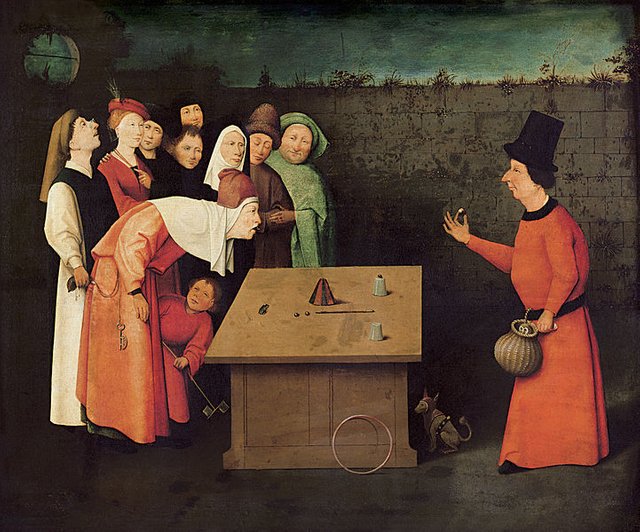Fantastic Vs. Crazy. A Logical Fallacy of Frozen Abstraction

The Conjurer by Hieronymus Bosch (between 1496 and 1520) - Image in the Public Domain (Wikimedia Commons)
It is not a trick.
There is logic implied in invention. Imagination is key to the visualization of whatever plan you will work on. American author Edgar Alan Poe has discussed it in his short story “The Murders of the Rue Morgue” (1841): a chess player must calculate a variety of moves and its possible consequences (the opponent’s response). I like to think of imagination, as a game of fill in the blanks, for you must guess what happens between point A and point C: you must recreate B.
I have seen how many of my students and a few friends I have gotten to talk about this, think of fantasy as something crazy just because this is an exercise of imagination. Wrong. Not all you imagine is a fantasy. And not all fantasies are created equal. As in any other business implying linguistic displays, you must consider polysemy.
If you read the definitions of fantasy from the Merriam Webster Dictionary, for example, you will find these interesting—and confusing—ones, besides its synonyms “hallucination,” “fancy,”and “caprice”:
- “the free play of creative imagination”
- “the power or process of creating especially unrealistic or improbable mental images in response to psychological need.”
These meanings create an opinion in readers that imagination is mostly about freedom, the unreal, and the improbable, which erroneously leads them to the notion of the impossible. This is a delicate matter, which needs to be taken care of with due care.
Italian author Gianni Rodari has discussed it in his book The Grammar of Fantasy (1973). Thomas Pavel has discussed it thoroughly in his Fictional Worlds (1986). A world of fiction is—must be—verisimilar.
You need to set the rules by which your creation will work in a determined world. Sometimes you need to create the very world that can actually house your creatures. Children’s Lit is not the exception to this.

Thanks for reading this part 1/5.
Posted from my blog with SteemPress : https://marlyncabrera.timeets.com/2019/01/13/fantastic-vs-crazy-a-logical-fallacy-of-frozen-abstraction/

Soy miembro de @talentclub.

Very interesting, organized and profound introductory discussion. I will wait for the others.
I have had similar experiences:
My students often say that imagination can do anything, that it has absolute freedom. We use class time to explore the logic that governs the imagination, and much more when imaginary creations involve highly organized worlds, as often happens in novels and other forms of art.
Pendiente.
What a surprise, @adncabrera ☻
Thanks for the visit. I have already posted the second part, where I briefly discuss frozen abstraction. My intention is discussing point by point the ideas behind the general confusion around the word Fantasy and how it affects writing in the genre.
I think most if not all teachers who work with literature have had a hard time trying to teach young students about verisimilitude, and I don't think thick theory helps much those ones who are naive enough to misunderstand it; this is why I'm trying to make it a bit casual.
Much appreciated, @EduVenezuela ☻♥